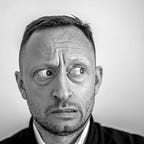Idea. Potential. #6
In this edition, I want to bring a little philosophy into your daily life, and that’s why this one is late (it took a long time to make this ramble into anything coherent and brief). I spent a decade of my life absorbed in sociological and philosophical material, and now I’m fully in the world of digital and marketing. I sometimes get asked what those years spent in Adorno, Foucault, and Hegel actually contribute to brand, marketing and data. It’s a good question: can I find an answer? I’ll let you be the judge.
Philosophy is useful though, and in many ways it impacts you whether you know it or not. It informs how you move through the world and perceive it, and there are ways of thinking and interpreting the world in the media we consume, and the politics we subscribe to. I’ll try to take just one interesting (at least, I think it’s interesting) train of thought and try to make it operable in the day-to-day; and as always, I link through to brief and enjoyable points of reference to start you off if you want to know more.
Here’s a couple of key concepts in philosophy to get us started (apologies if these are familiar to you already).
Epistemology
This is the theory of knowledge. Epistemology is not ‘a’ theory of knowledge, rather it refers to how things can be known and come to be known. Philosophers and social scientists argue a lot about what is knowable and unknowable to all of us. But even without these skirmishes, we all have our own learned method(s) of turning experience into knowledge.
Ontology
This is the theory of being. We all carry assumptions the nature of reality, and these range across a huge spectrum from the positivists who believe in an objective reality that can be studied and captured, through to the solipsists who believe that everything and everyone in the world are figments of their imagination (in other words, they are the only thing that ‘is’).
Everyone has their own theory of knowledge and theory of being (even if they are dogmatic about a doctrinal form of epistemology or ontology that they have read or picked up somewhere), and we are constantly mediating these through our own consciousness. Maybe this is a little confusing, so let’s get to a starting point of what I’m talking about.
Your office probably isn’t there (kind of)
Immanuel Kant loved thinking about thought, and 200 years ago, he compiled some of the most complex texts of the enlightenment on the subject of logic and reason. He produced a central thesis on ‘transcendental logic’ (and his most famous on the ‘categorical imperative’). He put forward the idea that we required categories of thought (or ways of organising thought into concepts of understanding), to comprehend forms of representation through our sensations. He followed Aristotle in believing that there were 12 pure concepts, such as ‘reality’, ‘causality’, and ‘impossibility’, for example, added to two concepts of “pure intuition”: ‘space’ and ‘time’ (to get what he means by ‘pure intuition’, ask yourself now: what is ‘space’ and what is ‘time’? You have a feel for them as you experience them, but few outside of astrophysics really understand what they are).
Kant’s epistemology was that concepts can come to be known through rationalisation into categories of thought. Later, Hegel reacted to Kant’s work with a fascination with attempts to define categories until they were irreducible, and could only be defined by using their opposite (i.e. by saying ‘this’ is not ‘that’). Play this out with me for a moment to see what I mean:
Q: what’s a dog?
A: it’s an animal.
Q: What’s an animal?
A: it’s a living thing.
Q: what is it to live?
A: it is ‘to be’, or ‘being’.
Q: what’s being? (hard now, right?)
A: being is the opposite of ‘nothing’.
This became the foundation of what’s called dialectics which we don’t need to go into here. But the important thing to know is that Hegel believed that this form of categorising was not just a thought experiment, but a means of thinking that was metaphysical. In other words, this thinking produced the being of things. Another way of saying this is that Hegel’s ontology was one where objects had no objective substance beyond thought. Yet another way of saying this is that there is no single rationally observable reality.
Fast forward 200 years, and we come to Holographic Theory (HT) within the field of physics. HT is a form of string theory that assumes a field of data with which our perception (in fact all perception of all beings) interacts, somewhere in a sub-dimension of the universe (trippy right?).
The connection between Kant, Hegel and HT is that all are saying that there is a relationship between data (or knowledge), perception, and what can be said to ‘be’ (or at least, what can be experienced or measured). And this then leads to a question, if thought about, perception of, and interaction with things, are all central to what can be said to ‘be’, then is it possible that if no being was thinking about, perceiving, or interacting with your office, is it actually there?
How to put this into effect:
On the one hand, this is extremely useful reminder that the way you think about the world and the things in it is crucial to your perception of what is happening to you and others. And everyone else’s thoughts and perceptions are similarly so. But for Kant, Hegel and HT, it’s forming the very basis of your reality. On the other hand, why worry about anything at all? If you ignore it, it’s probably not there, and anyway you’re probably just skimming around on the surface of a black hole.
